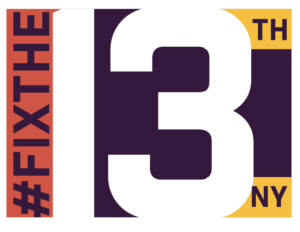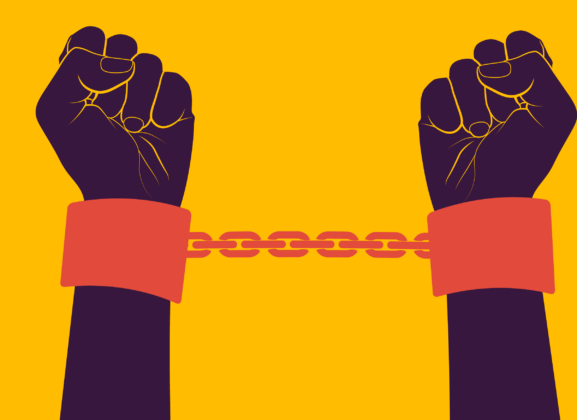“Neither slavery nor involuntary servitude, except as a punishment for crime whereof the party shall have been duly convicted, shall exist within the United States, or any place subject to their jurisdiction.”
—13th Amendment to the U.S. Constitution (emphasis added)

The #FixThe13thNY campaign will work to abolish forced labor and improve wages and working conditions for the incarcerated in New York State, and to end exploitation and value the humanity of all people, including individuals who are incarcerated.
Quick Links: Sign onto the Campaign | Download the #Fixthe13thNY Factsheet
 Launch Event: January 17th
Launch Event: January 17th
Join Next100 and the #FixThe13thNY on January 17, 2022, Martin Luther King Jr. Day, to launch our campaign that will work to abolish forced labor and improve wages and working conditions for the incarcerated in New York State. We will work to end exploitation and value the humanity of all people, including individuals who are incarcerated. > Register Now
What You Should Know About the 13th Amendment
The 13th Amendment Loophole
- In 1865, the 13th Amendment to the U.S. Constitution abolished slavery—in most, but not all, cases. It remained legal “as a punishment for crime.”
- Ironically, this amendment, which ostensibly was meant to end slavery, just reformed and perpetuated it. Even after the 13th Amendment abolished enslavement, racially discriminatory measures like the post-Reconstruction Black Codes and Jim Crow Laws, along with state-sanctioned labor practices like convict leasing, continued to force many Black Americans into involuntary labor for decades. Even today, half a century after the Civil Rights movement took the country by storm, the United States suffers from a mass incarceration boom that has left 1.8 million Americans incarcerated and another 4.5 million people under some form of parole and/or probation. Of those who are incarcerated, almost 40 percent percent are Black and over 30 percent are Latinx..
- If we close the loophole in the amendment, it will finally finish the job started by the Civil War and the Emancipation Proclamation, and will make the 13th Amendment do what it was supposed to do all along: end the morally reprehensible practice of slavery and forced labor in America.
The implications for individuals who are incarcerated in New York State
30,803 incarceratedIn New York State, 30,803 people are currently incarcerated, and are disproportionately Black and Latinx. |
50 percentBlack New Yorkers make up 18 percent of state residents, but 50 percent of those incarcerated. Latinx individuals make up 22 percent of the incarcerated population. |
$53 million in revenuePeople incarcerated are forced to work, and they produce upwards of $53 million a year in revenue for the state |
- In New York State, 30,803 people are currently incarcerated, and are disproportionately Black and Latinx. Black New Yorkers make up 18 percent of state residents, but 50 percentof those incarcerated. Latinx individuals make up 22 percent of the incarcerated population. People who are incarcerated are forced to work, and they produce upwards of $53 million a year in revenue for the state through Corcraft, a corporation run by the Department of Corrections and Community Supervision, from which it requires state agencies to make purchases.
- In New York State, incarcerated people are paid far below the minimum wage. On average, detainees in New York State prisons earn approximately $0.65 an hour, with some earning as little as $0.16 an hour.
- Incarcerated people are forced to work without any federal and state employment protections, and far below minimum wage. They do not receive paid sick leave, mandatory overtime for unsalaried employees, OSHA protections, or unionization rights.
How do we start to create fair working conditions for incarcerated workers in New York State?
- The #FixThe13thNY campaign is asking the State Assembly and State Senate to ensure the incarcerated are not forced into labor by passing legislation to prohibit it. This legislation must include an absolute ban on incarcerated individuals being compelled to work against their will.
- In addition, a living-wage standard should be introduced into prisons, one which includes a meaningful minimum wage, labor protections, and protection from abuses. A good start would be for New York State to raise wages for all incarcerated people to the state minimum wage.
- People who are incarcerated shouldn’t be forced into involuntary training, or into training that is not going to create job prospects when they leave. Currently the recidivism rate in New York is 41 percent. To lower it, we have to ensure that incarcerated individuals have access to quality, meaningful training opportunities, and that they have the autonomy to choose these opportunities as they see fit.
- Working conditions must be improved for people who are incarcerated. Incarcerated individuals should be able to unionize, forty hours per week. Incarcerated people are forced to work without standard federal and state employment protections, including minimum wage, paid sick leave, mandatory overtime for unsalaried employees, OSHA protections, or unionization rights.
How to Get Involved
- Sign onto the campaign as an individual or organization here
- Follow us on Instagram at @Fixthe13thNY
- Email us at [email protected]

How to Get Involved
- Sign onto the campaign as an individual or organization here
- Follow us on Instagram at @Fixthe13thNY
- Email us at [email protected]




